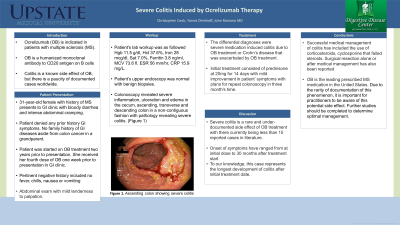Monday Poster Session
Category: Colon
P1652 - Severe Colitis Induced by Ocrelizumab Therapy
Monday, October 23, 2023
10:30 AM - 4:15 PM PT
Location: Exhibit Hall

Has Audio

Christopher Cook
Gastroenterology and Hepatology of CNY
Liverpool, NY
Presenting Author(s)
Christopher Cook, 1, Yannis Dimitroff, 2, John Romano, MD1
1Gastroenterology and Hepatology of CNY, Liverpool, NY; 2SUNY Upstate Norton School of Medicine, Liverpool, NY
Introduction: We report a case of a 31-year-old female with history of multiple sclerosis (MS) who presents with severe colitis following administration of ocrelizumab (OB). OB is a humanized monoclonal antibody to CD20 antigen on B cells. OB is indicated in patients with primary progressive MS or relapsing MS. Colitis is a known side effect of OB, but there is a paucity of documented cases worldwide.
Case Description/Methods: Our patient was started on OB treatment two years prior to presentation. She received two induction doses and then a third dose six months thereafter. Patient had no complaints prior to these infusions. She received her fourth dose of OB one week prior to presentation in GI clinic with complaints of bloody diarrhea and intense abdominal cramping. Pertinent negative history included no fever,chills,nausea or vomiting. vitals were: 138/94 mm/Hg, 83 bpm, 16 resp/min, temp of 97 degrees. Abdominal exam with mild tenderness to palpation. Lab workup with (Hgb 11.5 g/dl, Hct 37.6%, Iron 28 mcg/dl, Sat 7.0%, Ferritin 3.8 ng/ml, MCV 73.6 fl, ESR 56 mm/hr, CRP 15.9 mg/L). She denied prior history of any form of inflammatory bowel disease or family history of GI diseases aside from colon cancer in a grandparent. Patient’s upper endoscopy was normal with benign biopsies. Colonoscopy revealed severe inflammation, ulceration and edema in the cecum, ascending, transverse and descending colon in a non-contiguous fashion with pathology revealing severe colitis. The differential diagnoses were severe medication induced colitis due to OB treatment or Crohn’s disease that was exacerbated by OB treatment. Initial treatment consisted of prednisone at 20mg for 14 days with mild improvement in patient’ symptoms with plans for repeat endoscopy in three month time.
Discussion: Severe colitis is a rare and under-documented side effect of OB treatment with there currently being less than 15 reported cases in literature. Onset of symptoms have ranged from at initial dose up to 30 months after. To our knowledge, this case represents the longest development of symptoms after initial treatment date. Successful treatment of the colitis has included use of corticosteroids, salvage therapy with cyclosporine that failed and needed surgical resection to surgical resection alone. OB is the leading prescribed MS medication in the United States. Due to the rarity of documentation of this phenomenon, it is important for physicians to be aware of this potential side effect, further studies should be completed.

Disclosures:
Christopher Cook, 1, Yannis Dimitroff, 2, John Romano, MD1. P1652 - Severe Colitis Induced by Ocrelizumab Therapy, ACG 2023 Annual Scientific Meeting Abstracts. Vancouver, BC, Canada: American College of Gastroenterology.
1Gastroenterology and Hepatology of CNY, Liverpool, NY; 2SUNY Upstate Norton School of Medicine, Liverpool, NY
Introduction: We report a case of a 31-year-old female with history of multiple sclerosis (MS) who presents with severe colitis following administration of ocrelizumab (OB). OB is a humanized monoclonal antibody to CD20 antigen on B cells. OB is indicated in patients with primary progressive MS or relapsing MS. Colitis is a known side effect of OB, but there is a paucity of documented cases worldwide.
Case Description/Methods: Our patient was started on OB treatment two years prior to presentation. She received two induction doses and then a third dose six months thereafter. Patient had no complaints prior to these infusions. She received her fourth dose of OB one week prior to presentation in GI clinic with complaints of bloody diarrhea and intense abdominal cramping. Pertinent negative history included no fever,chills,nausea or vomiting. vitals were: 138/94 mm/Hg, 83 bpm, 16 resp/min, temp of 97 degrees. Abdominal exam with mild tenderness to palpation. Lab workup with (Hgb 11.5 g/dl, Hct 37.6%, Iron 28 mcg/dl, Sat 7.0%, Ferritin 3.8 ng/ml, MCV 73.6 fl, ESR 56 mm/hr, CRP 15.9 mg/L). She denied prior history of any form of inflammatory bowel disease or family history of GI diseases aside from colon cancer in a grandparent. Patient’s upper endoscopy was normal with benign biopsies. Colonoscopy revealed severe inflammation, ulceration and edema in the cecum, ascending, transverse and descending colon in a non-contiguous fashion with pathology revealing severe colitis. The differential diagnoses were severe medication induced colitis due to OB treatment or Crohn’s disease that was exacerbated by OB treatment. Initial treatment consisted of prednisone at 20mg for 14 days with mild improvement in patient’ symptoms with plans for repeat endoscopy in three month time.
Discussion: Severe colitis is a rare and under-documented side effect of OB treatment with there currently being less than 15 reported cases in literature. Onset of symptoms have ranged from at initial dose up to 30 months after. To our knowledge, this case represents the longest development of symptoms after initial treatment date. Successful treatment of the colitis has included use of corticosteroids, salvage therapy with cyclosporine that failed and needed surgical resection to surgical resection alone. OB is the leading prescribed MS medication in the United States. Due to the rarity of documentation of this phenomenon, it is important for physicians to be aware of this potential side effect, further studies should be completed.

Figure: Ascending colon showing severe colitis
Disclosures:
Christopher Cook indicated no relevant financial relationships.
Yannis Dimitroff indicated no relevant financial relationships.
John Romano indicated no relevant financial relationships.
Christopher Cook, 1, Yannis Dimitroff, 2, John Romano, MD1. P1652 - Severe Colitis Induced by Ocrelizumab Therapy, ACG 2023 Annual Scientific Meeting Abstracts. Vancouver, BC, Canada: American College of Gastroenterology.
